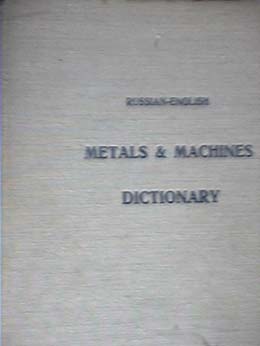
AH rights reserved. This book, or any part thereof, /nay not be Reproduced in any form without written permission from thevuthor and the publisher.
PREFACE
Experience has shown that three reliable bilingual dictionaries are needed for a high-quality translation of a modern special technical text: a general language dictionary, a polytechnic dictionary, and a special dictionary. This Metals & Machines Dictionary belongs m the latter class. It is intended for the English-speaking scientists, researchers, engineers, editors, librarians, translators, students, and other workers who deal with Russian publications in the fields it covers. The Dictionary is based on modern and reliable primary sources in both languages; wherever available, American standard nomenclature and abbreviations have been used.
The Dictionary comprises about 9,000 Russian entries. It covers primarily: mtttalltirgy and metallurgical engineering including both ferrous and nonferrous metals and alloys, steelmaldng, rolling, founding, welding, powder metallurgy, etc.; molecular structure and physical properties of metal) and alloys, hardening, heat-treating, etc.; cold and hot metaiworking including forging, bending, drawing, extruding, pressing, spinning, etc.: machines and machining, such as turning, milling, planing, broaching, grinding, polishing, lapping, etc. Also included are; machine elements, various tools, manufacturing processes, ore beneficiation and hydrometallurgy; Russian transliteration of Western names frequently encountered in metallurgical publications (sometimes quite difficult to recognize, e.g., Геру Heroult); abbreviations and a lot of Russian shop slang.
All Russian entries are arranged in a single alphabetical list, so that whatever entry is desired the reader needs to open the Dictionary only once. Three types of cross references are usd: «• refers to a synonym or near-synonym; «•• olio refers to a closely related or derived term; e» refers to a different part of speech, or a term of different meaning, or an antonym. As is customary, only the imperfective aspects of Russian verbs are translated. The abbreviation p. a. of serves to refer the perfective aspects.
The R-E Metals & Machines Dictionary has a negligible overlap with our R-E Atomic Dictionary. They admirably supplement each other for many fields of application.
Цена: 150руб.